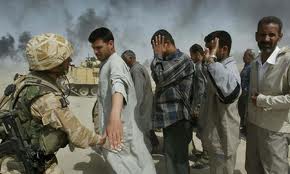 Reports of the extensive abuse, torture and rape of prisoners and civilians in Iraq by British soldiers is one of the most disturbing pieces of news to appear in recent days.
Reports of the extensive abuse, torture and rape of prisoners and civilians in Iraq by British soldiers is one of the most disturbing pieces of news to appear in recent days.
Disturbing and sad for those of us who like to think of our nation as civilised and compassionate even in a combat zone, and unpleasant proof – almost unpalatable, when you see the images of ‘our lads and lasses’ at work – of the hypocrisy of holier than thou attitudes peddled by British Governments from the colonial era through to the present day with regard to the beastliness of others. Hopefully, as a result of recent publicity, something will change in the way the army is allowed to act when abroad, but the fact that a large group of Iraqis is having to go to court to show how they were victims of systemic British brutality – i.e. not of rogue soldiers or local commanders acting off their own bat – is unfortunately not surprising.
Britain has a long and dishonourable tradition of brutality and uncivilised behaviour towards the inhabitants, as well as the soldiers, of ‘foreign’ places that it has invaded and./or is occupying – including the Irish. It is a shameful history that stretches back into the ‘glorious’ days of empire when there was, in the name of white ‘settlement’, systemic mistreatment of Maori in New Zealand and indigenous peoples in Australia and Canada, as well as the setting up of concentration camps in the Boer War. Earlier in the 19th century, in a previous invasion of a far off land called Afghanistan, whole villages were laid waste systematically and their inhabitants abused or killed. More recently the revelations regarding extreme torture in Kenya, and the likely execution of a similar government policy in places such as Malaysia and Aden are further evidence of a tradition that is not based on the behaviour of sadistic individuals (though the army does not discourage the recruitment of such people), but is part of a concerted military (and thus government) strategy to terrorise local populations and force them into submission.
The Second World War with its largely conscript army seems to have been, on the whole, an exception, but when the war or conflict being engaged in by Britain has not had a clear ‘just war’ tag (or is a form of occupation, or so-called settlement, of a foreign land) – and, in particular, when the people affected are non-Caucasians – military brutality is given its head as a (covert) part of official policy. Add to this (a) the top down brutalisation of soldiers in military training through unquestioning obedience to authority and the turning of a blind eye to bullying and sexual abuse in barracks, and (b) the imitation of sadistic sexual practices seen on Internet, and we have the perfect recipe for a fighting force ready to torture others, almost, it appears, for fun and in our name.
It may not be possible to rule out the presence of sadists in the armed forces, but it is possible to disseminate and demand an ethos of humane treatment of prisoners and civilians in combat – in other words, to stop sadism and brutality from being a sanctioned mode of behaviour that is accepted and encouraged as a necessary evil by the political and military authorities. It is possible to have a civilised army, as countries such as Germany, who have learnt the lessons of history, have proved. Britain, it seems, has yet to learn – perhaps because it has never been defeated and had its practices held up to the light by outsiders. Until it does, or the government introduces real safeguards, the arrival of British troops in your country will be no guarantee of safety – or civilised behaviour.
